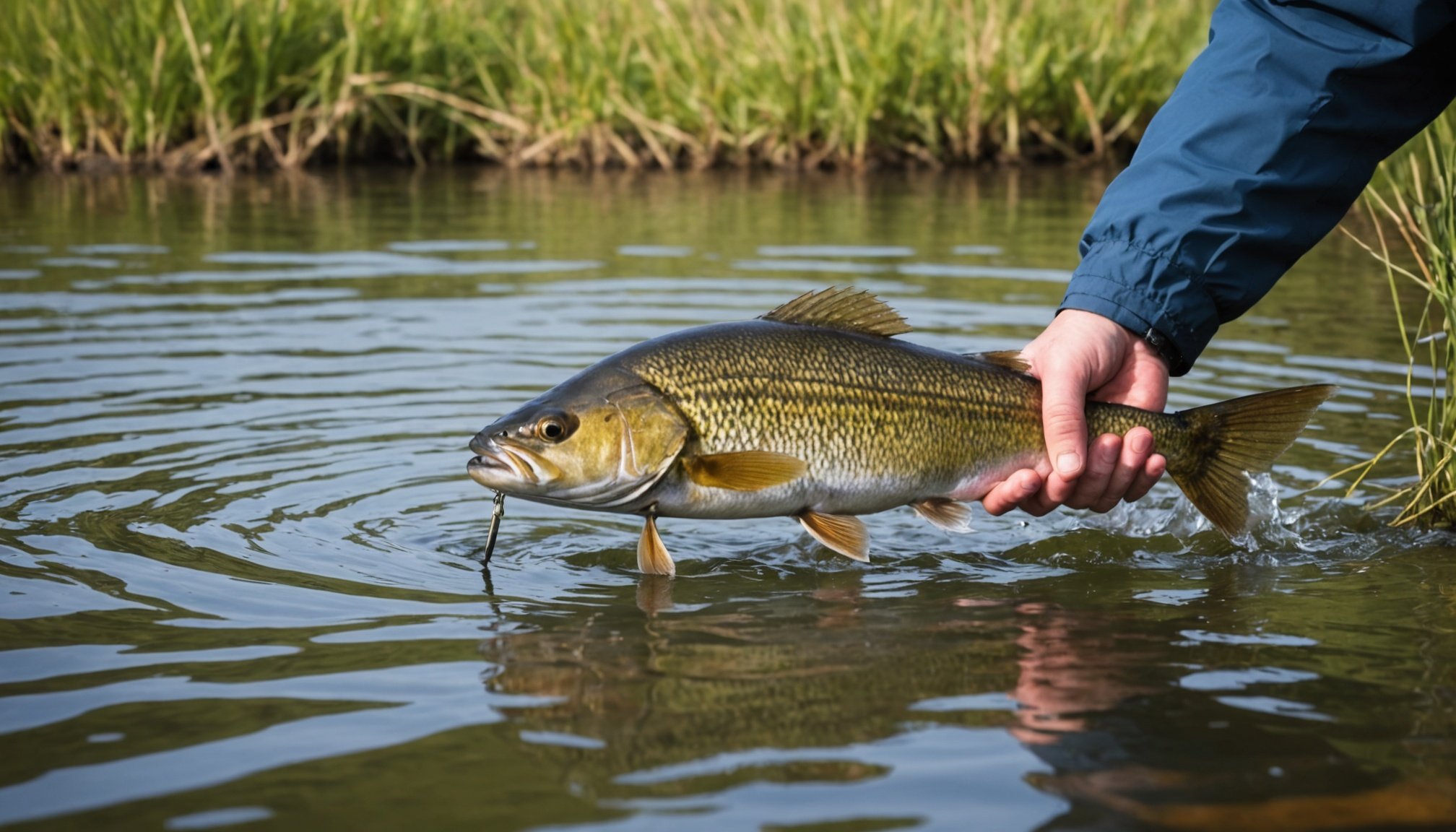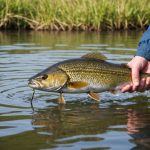Overview of Sustainable Fishing Practices
Sustainable fishing plays a crucial role in preserving marine ecosystems. Sustainable fishing is defined as harvesting fish in ways that do not compromise the needs of future generations. It involves practices that maintain fish populations and the habitats they live in, reducing the ecological impact on the environment.
The ecological impact of fishing practices can be significant. Overfishing leads to depleted fish stocks, which disrupts food chains and causes imbalance in marine ecosystems. Bycatch, the unintentional catch of non-target species, also poses a serious threat, often affecting endangered species. It’s vital to adopt practices that minimise these impacts.
Cela peut vous intéresser : Transforming UK Golf Courses: Effective Strategies for Enhancing Wildlife Harmony
Fishing regulations are integral to sustainable fishing efforts. In the UK, these regulations are designed to ensure that fish stocks are harvested sustainably. The country employs a variety of measures such as quotas, seasonal restrictions, and protected zones to regulate fishing activities. Compliance with these regulations helps mitigate the ecological impact and promote the long-term health of marine environments.
Understanding and adhering to fishing regulations not only supports the conservation of fish populations but also ensures the viability of the fishing industry for the future. Sustainable fishing is a shared responsibility that benefits both the environment and fishing communities.
A lire aussi : Combatting Plastic Pollution: How the UK is Protecting Seabirds from Ingesting Harmful Waste
Catch and Release Techniques
Understanding catch and release is crucial for sustainable fishing. It involves returning fish unharmed, ensuring their survival and reproduction. This practice reduces fish mortality but only when done correctly.
Best Practices for Successful Catch and Release
The key to effective catch and release lies in stress reduction. Using barbless hooks hastens release and decreases injury, essential for fish welfare. Reeling in fish quickly limits their exhaustion, making their recovery smoother once back in the water.
Understanding Fish Mortality and Stress Factors
Fish mortality often correlates with improper handling. Regularly wetting hands before contact prevents skin damage. Avoid dragging fish onto dry surfaces; this strips off their protective slime layer, elevating stress. Recognising these elements can significantly improve fish survival rates.
Importance of Proper Handling Techniques
To ensure minimal harm, hold fish horizontally to support their weight. Minimising air exposure: aim for less than 30 seconds. Observing fish behaviour helps gauge their stress level and react accordingly. By adopting responsible handling practices, anglers can significantly lower post-release mortality rates and support a healthier ecosystem.
Habitat Preservation Strategies
The protection of aquatic ecosystems is vital for maintaining healthy fish populations. Healthy environments ensure sustainable fishing practices, benefiting both biodiversity and local communities. By prioritising habitat conservation, we contribute to environmental protection and the longevity of these ecosystems.
Several strategies can be employed to preserve natural habitats while engaging in fishing activities. One effective approach is implementing catch limits to prevent overfishing. This ensures that fish populations remain robust, contributing to the overall health of aquatic ecosystems. Additionally, employing sustainable fishing gear, such as selective nets, minimises damage to non-target species and their habitats. These methods reflect a conscious effort towards habitat conservation.
Collaboration with conservation organisations plays a pivotal role in habitat restoration efforts. These partnerships facilitate access to resources and expertise, enhancing the effectiveness of conservation initiatives. Joint projects often focus on rehabilitating degraded areas, reintroducing native species, and monitoring the health of aquatic ecosystems. Such cooperation underscores the importance of collective action in achieving long-term environmental protection goals.
Through these strategies and collaborative efforts, we can ensure that our aquatic ecosystems remain vibrant and resilient, supporting the diverse life forms that depend on them. By prioritising habitat conservation, we actively contribute to the preservation and enhancement of our natural world.
Compliance with Fishing Regulations
Understanding and adhering to fishing laws is essential for both hobbyists and commercial fishers in the UK. These laws include various restrictions based on species, size, and fishing seasons. It’s important to differentiate between saltwater and freshwater regulations, as they can vary significantly. By complying with local rules, fishers help ensure sustainable fish populations, thereby supporting vital conservation efforts.
Informed fishers contribute positively not just to fish stocks but also to the broader ecosystem. Stay updated with local regulations through government websites or fishing associations to avoid unintentional breaches. Understanding the specific requirements of conservation efforts—such as catch limits and protected areas—empowers fishers to play an active role in maintaining ecological balance.
Moreover, compliance isn’t just about avoiding penalties; it’s a step towards a sustainable future. Fishers who prioritise sustainability often join collaborative networks that share knowledge and best practices. These networks promote responsible fishing and resource management, fostering a culture of cooperation.
Ultimately, understanding and complying with local regulations help protect aquatic biodiversity for generations to come. This not only benefits the environment but also secures the future of the fishing industry itself.
Community Involvement and Education
Community engagement plays a crucial role in promoting sustainable fishing practices, ensuring marine ecosystems thrive for future generations. Educational initiatives help raise awareness and instil practices that significantly impact conservation efforts.
Successful outreach programs often involve hands-on activities, allowing individuals to experience fishing sustainably. These initiatives not only educate but also foster a sense of responsibility towards aquatic life. By participating in such programs, community members gain firsthand knowledge of how their actions can protect or disrupt marine environments.
Local fishing clubs and organizations are pivotal in these efforts, often leading the charge in promoting sustainability. These groups organise workshops and training sessions to educate both seasoned fishers and newcomers about the importance of ethical fishing techniques.
For instance, some clubs have developed partnerships with schools and local councils to extend their reach, offering tailored seminars that target various community groups. Through these collaborations, fishing education becomes more than just a niche interest; it turns into a communal responsibility, encouraging everyone to contribute to preserving fish populations and habitats.
The Ecological Importance of Sustainable Fishing
In the delicate fabric of marine ecosystems, maintaining ecological balance is paramount. It is crucial not just for maintaining fish populations but for the broader marine health.
Overfishing is a significant threat. When species are overly exploited, it disrupts the natural order, leading to population imbalances. Declines in fish populations can have cascading effects, weakening the resilience of entire ecosystems. Moreover, some species may face extinction, undermining the integrity and biodiversity of marine environments.
Adopting sustainable fishing practices is vital. By prioritising these practices, we are actively promoting healthier seas. These methods help ensure that fishing activities do not surpass the regenerative capacities of fish species. This sustainable approach creates opportunities for populations to recover while maintaining ecological balance.
The benefits extend beyond the ocean. Sustainable fishing helps preserve the shorelines and supports coastal communities that rely on marine resources. In these communities, maintaining marine health is not just an ecological imperative but a socio-economic one. By fostering robust fish populations, we support both ecological health and human well-being, enabling thriving marine ecosystems for future generations.
Case Studies and Success Stories
Exploring sustainable fishing success involves examining significant case studies that highlight effective strategies. One notable example is the Marine Stewardship Council’s work with the Alaskan Pollock Fishery. This case study showcases the importance of adhering to best practices, such as setting stringent catch limits and enforcing robust management measures, which have led to a stable fish population and continued industry viability.
Another successful initiative is the Seychelles’ Fisheries Partnership Agreement with the European Union, focusing on preserving marine biodiversity while sustaining local economies. Key best practices include deploying satellite technology for monitoring, improving enforcement, and fostering transparent governance.
Lessons learned from these success stories emphasize the need for stakeholder collaboration, scientific research integration, and adaptive management approaches. The following are crucial insights:
- Implement adaptive management practices to respond to changing conditions.
- Foster collaboration among government bodies, non-profit organizations, and local communities.
- Combine scientific data with traditional practices for informed decision-making.
These sustainable fishing success stories illustrate that aligning ecological, economic, and social goals can lead to prosperous and resilient fishing communities. By adopting such best practices, the path to sustainable fisheries becomes achievable and beneficial.











